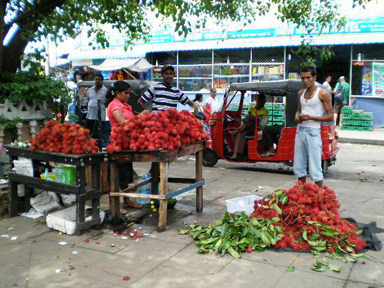|
Musings:
Ranchagoda Lamaya - a woman who never grew old
by Padma Edirisinghe
Due to our getting victimized by the colonial system of education,
which, pardon me , had its plus points too, some of us are more
acquainted with certain western characters than with their Eastern
counterparts. For example, Rip Van Winkle who never grew old is more
familiar to us than Ranchagoda Lamaya, a damsel of a village in the
South. But she , unlike Rip Van Winkle is not unique for she belongs to
a multitude of the particular caliber of females who lived and died in
the first half of the last century, never growing old, at least
nominally.
Prefixed
|

Fruit stall in Colombo. Pic courtesy: Wordpress.com |
They were all known as Lamaya (child) prefixed by the name of the
village they originally hailed from. Thus, in my village that can be
labelled as one of the most rural of villages of Sri Lanka there thrived
women as Rassapane lamaya, Miriswatte lamaya and Mangalathiriye lamaya.
Never mind, that their backs are bent while breasts sag long and ugly as
of the old women manufactured by Ambalangoda Puppetry Works, they are
yet called Lamaya. They have all come via Deega marriages to this
village and are identified by the name of the village they hail from.
Most of them take life for granted in their new village. Be they
happy ,be they sad , they all settle down taking their lot as a result
of Kamma, thanks to the greatest thinker in the neighbouring country.
Very few protest at the plummeting of fortunes and go back. Even a fewer
utilize aesthetic techniques such as composition of free and non-rhyming
verses to ventilate their grievances. Ranchagoda Lamaya was one such
aesthetic exponent.
I first got curious about this dame as I glimpsed through a
collection of poetry by women of bygone days, a collection maintained by
my mother despite the onerous task of rearing seven children and also
engaging in the teaching profession and even working as consultant to
the head ie. her husband. Ranchagoda Lamaya occupied a premier place in
that collection.
Though this collection itself is now no more (displaced by time)
certain content matter remained etched within me. Many of the poetesses
seems to have undergone duller and less prosperous days after their
marriage. Some totally disappear. One such was Pilikuttuwe Kamala who
marries into Sath Korale and is heard no more despite her poetic gushing
in Pilikuttuwa of the Western Province. I wonder whether she was called
‘Pilikuttuwe lamaya’.
Marriage
Ranchagoda lamaya, the subject of this essay too manages to maintain
her aesthete senses even after marriage. She seems to be proud of her
birth village, Ranchagoda that occurs in several of her free verses and
her discontent with Ruhuna to where she comes through marriage ties she
expresses tersely.
“Mehev ratey Ranchagoda ipadeela
Ruhuna ratata mama deela ilawwe”
(Ilawwa denotes a house of death. So she has arrived in the house of
death).
No wonder, this metaphor for she is forced to feed on green leaves.
Palaa kola kaka kata hamayanawaya
Sama deiyane mage vahe rako rako
This succinct verse discloses the fact that too many green leaves are
wounding her mouth but she pleads for her husband’s welfare. May all the
gods bless him! That is the epitome of the Sinhala Buddhist woman ready
to bear her misfortunes. Divorce Courts, she never visualizes however
hungry she goes.
Another verse by the female poetesses, in my mother’s collection I
remember. The topic is a trip to Colombo, by foot most probably for no
vehicles were available.
Ehev rate kolombata mama yana vitaka,
Kavuruth nokana pani waraka manga depasa”
Populace
This village woman is aghast at the waste of natural food by the
urban populace.
Ranchagoda lamaya is so poor that her pillow is the grinding tone.
But she manages to let out her emotions through poetry. At the time she
exulted poetically women never went to school and it is obvious that she
did not know to read and write. But gush, she did poetically. |

